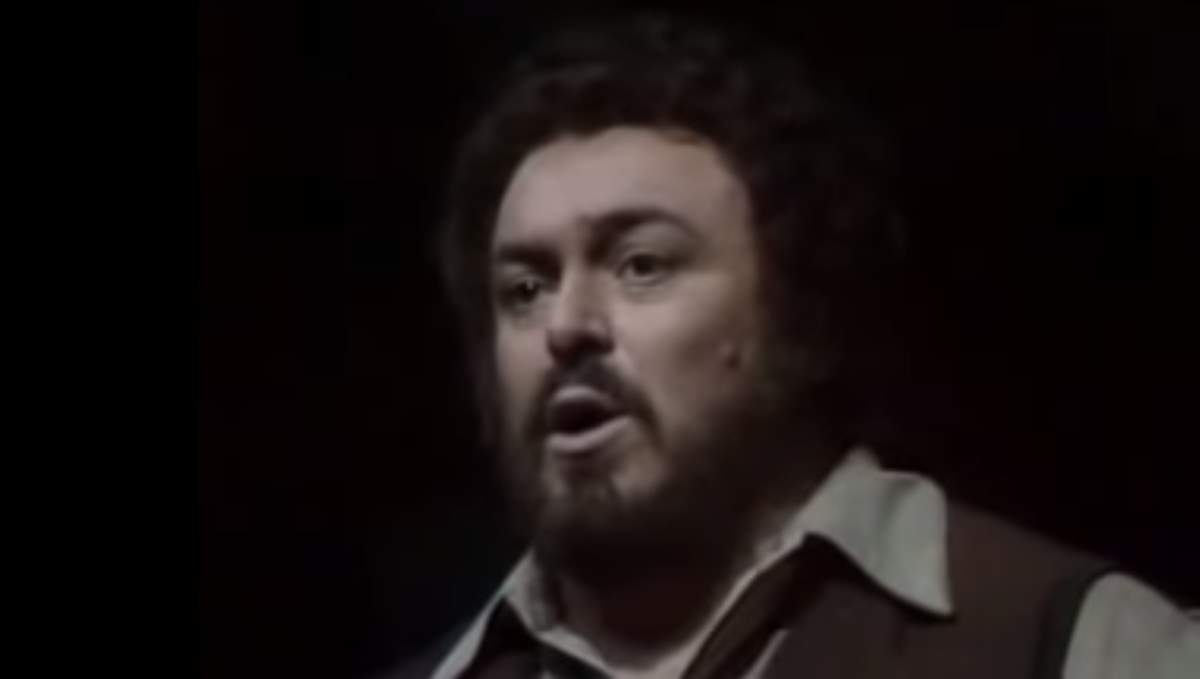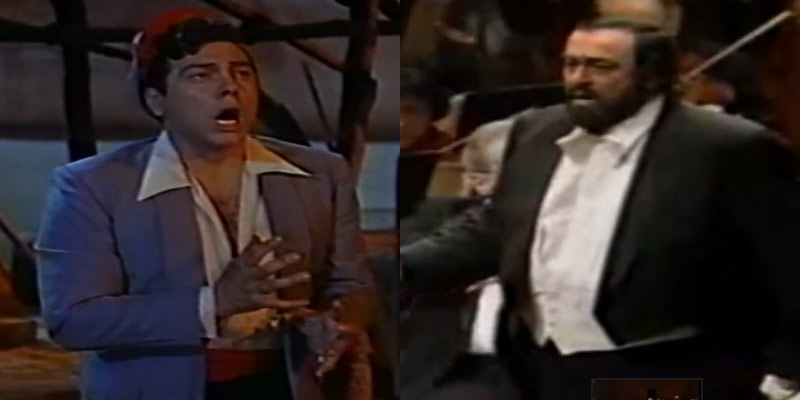A gala concert by the legendary Italian tenor Luciano Pavarotti at the Royal Albert Hall, London in 1982. Royal Philharmonic Orchestra conducted by Kurt Herbert Adler.
Pavarotti Royal Albert Hall Gala Concert Program
With the starting times in the video:
- 02:10 Verdi: Overture, La forza del Destino.
- 11:00 Puccini: “Recondita Armonia” from Tosca.
- 13:55 Verdi: “Ah, la paterna mano” from Macbeth.
- 17:48 Verdi: “La mia letizia infondere” from I Lombardi alla Prima Crociata.
- 21:00 Verdi: “Quando le sere al placido… L’ara, o l’avello” from Luisa Miller.
- 27:50 Donizetti: “Fra poco a me ricovero” from Lucia di Lammermoor.
- 35:40 Cilea: “Lamento di Federico” (È la solita storia del pastore) from L’Arlesiana.
- 40:35 Puccini: “E lucevan le stelle” from Tosca.
- 44:00 Donizetti: “Una Furtiva Lagrima” from L’Elisir d’Amore.
- 49:05 Puccini: “Nessun Dorma” from Turandot.
- 53:20 De Curtis : “Torna A Surriento”
1. La forza del destino overture
La forza del destino (The Power of Fate, often translated as The Force of Destiny) is an Italian opera by Giuseppe Verdi. The libretto was written by Francesco Maria Piave based on a Spanish drama, Don Álvaro o la fuerza del sino (1835), by Ángel de Saavedra, 3rd Duke of Rivas, with a scene adapted from Friedrich Schiller’s Wallensteins Lager. It was first performed in the Bolshoi Kamenny Theatre of Saint Petersburg, Russia, on 22 November (O.S. 10 November) 1862.
The overture (to the revised version of the opera) is part of the standard repertoire for orchestras and is often played as the opening piece at concerts.
2. Recondita armonia
“Recondita Armonia” is the first romanza in the opera Tosca, by Giacomo Puccini. It is sung by the painter Mario Cavaradossi when comparing his love, Tosca, to a portrait of Mary Magdalene that he is painting.
Italian text
Dammi i colori…
Recondita armonia di bellezze diverse!
È bruna Floria, l’ardente amante mia.
E te, beltade ignota, cinta di chiome bionde,
Tu azzurro hai l’occhio,
Tosca ha l’occhio nero!
L’arte nel suo mistero,
le diverse bellezze insiem confonde…
Ma nel ritrar costei,
Il mio solo pensiero,
Il mio sol pensier sei tu,
Tosca, sei tu!
English translation
Pass me the colors…
Concealed harmony of contrasting beauties!
Floria, my ardent lover, is dark-haired.
And you, unknown beauty, crowned with blond hair,
You have blue eyes,
Tosca has black eyes!
Art, in its mysterious way,
blends the contrasting beauties together…
But while I’m painting her,
My only thought,
My only thought is of you,
Tosca, it is of you!
3. Ah, la paterna mano (Macbeth)
Macbeth is an opera in four acts by Giuseppe Verdi, with an Italian libretto by Francesco Maria Piave and additions by Andrea Maffei, based on William Shakespeare’s play of the same name.
Italian
O figli, o figlio miei!
Da quel tiranno tutti uccisi voi foste,
e insiem con voi la madre
sventurata!
Ah, fra gli artigli di quel tigre
Io lasciai la madre e i figli?
Ah, la paterna mano non vi fu scudo,
o cari,
Dai perfidi sicari che a morte
vi ferîr!
E me fuggiasco, occulto voi
chiamavate invano
Coll’ultimo singulto, coll’ultio respir.
Ah! trammi al tiranno in faccia,
Signore, e s’ei mi sfugge
Possa a colui le braccia del tuo
perdono aprir.
English translation
O sons, o my children!
That tyrant has killed you all,
And together with you,
Your unfortunate mother!
Ah, in the claws of that tiger
Did I leave mother and sons?
Ah, the paternal hand didn’t shield you,
O my dears,
Treacherous killers have mortally
wounded you!
And as for me, I escaped, while I hid
You were calling in vain
With your last gasps, with your last breaths.
Ah! lead me to the tyrant,
Lord, if he should escape from me
May he, in Your open arms,
Find forgiveness.
4. La mia letizia infondere (I Lombardi alla prima crociata)
I Lombardi alla Prima Crociata (The Lombards on the First Crusade) is an operatic dramma lirico in four acts by Giuseppe Verdi to an Italian libretto by Temistocle Solera, based on an epic poem by Tommaso Grossi, which was “very much a child of its age; a grand historical novel with a patriotic slant”.
Italian
La mia letizia infondere, Oronte’s aria from I Lombardi
La mia letizia infondere
Vorrei nel suo bel core!
Vorrei destar co’palpiti
Del mio beato amore
Tante armonie nell’etere
Quanti pianeti egli ha:
Ag! ir seco al cielo, ed ergermi
Dove mortal non va.
Come poteva un angelo
Crear sì puro il cielo,
E agli occhi suoi non schiudere
Di verita de il velo?
Vieni, m’adducia lei,
Rischiari i sensi miei,
Vieni, e nel ver s ‘acquetino
La dubbia mente e il cor!
5. “Quando le sere al placido… L’ara, o l’avello” from Luisa Miller
Luisa Miller is an opera in three acts by Giuseppe Verdi to an Italian libretto by Salvadore Cammarano, based on the play Kabale und Liebe (Intrigue and Love) by the German dramatist Friedrich von Schiller.
Italian
Oh! fede negar potessi agl’occhi miei!
Se cielo a terra, se mortali ad angeli
Attestarmi volesser ch’ella non è rea,
Mentite! io responder dovrei, tutti mentite.
Son cifre sue!
Tanta perfidia! Un’alma sì nera! si mendace! Ben la conobbe ii padre!
Ma dunque i giuri, le speranze, la gioia,
Le lagrime, l’affanno?
Tutto è menzogna, tradimento, inganno!
Quando le sere al placido
Chiaror d’un ciel stellato
Meco figgea nell’etere
Lo sguardo innamorato,
E questa mano stringermi
Dalla sua man sentia…
E questa mano stringermi
Dalla sua man sentia…
Ah! Ah! Ah! mi tradia!
Ah! mi tradia!
Allor, ch’io muto, estatico
Da’ labbri suoi pendea,
Ed ella in suono angelico,
“amo, amo te sol” dicea,
Tal che sembrò 1’empireo
Aprirsi all’alma mia!
In suono angelico,
“amo te sol” dicea.
Ah! Ah! Ah! mi tradia!
Ah! mi tradia!
Ah! mi tradia!
Mi tradia!
In suono angelico,
“T’amo” dicea.
Ah! mi tradia!
English translation
Oh! I wish I could deny my own eyes!
If heaven and earth, if mortals and angels
Were to swear to me that she is not guilty…
Lies! I should answer,
All lies…this is her hand!
So much treachery! A black soul!
A liar! Well my father knew her!
But all the promises, the hopes, the joy,
the tears, the anguish?
Everything is a lie, betrayal, deception!
When in the evenings in the calm
The pale light of a starry sky
She gazed with me into the heavens
With a look of love,
And I felt this hand pressed
By her hand…
Ah! She betrayed me!
I was mute, ecstatic,
Hanging from her lips.
When she said in angelic tones
‘I love only you’,
It seemed like the world
Opened to my soul!
6. “Fra poco a me ricovero” from Lucia di Lammermoor
Lucia di Lammermoor is a dramma tragico (tragic opera) in three acts by Gaetano Donizetti. Salvadore Cammarano wrote the Italian language libretto loosely based on Sir Walter Scott’s historical novel The Bride of Lammermoor.
Italian
Tombe degli avi miei,
l’ultimo avanzo
d’una stirpe infelice…
Deh, raccogliete voi.
Cesso’ dell’ira il breve foco
Sul nemico acciaro
abbandonar mi vo’.
Per me la vita e’ orrendo peso
L’universo intero e’ un deserto
per me senza Lucia!
Di faci tuttavia splende il castello
Ah, scarsa ful na notte al tripudio.
Ingrata donna!
Mentr’io mi struggo in disperato pianto
tu ridi, esulti accanto
al felice consorte
Tu delle gioei in seno
io della morte!
Fra poco a me ricovero
dara’ negletto avello
Una pietosa lagrima
non scendera’ su quello.
Ah, fin deli estinti ahi misero…
manca il conforto a me.
Tu pur dimentica…
quel marmo dispregiato:
mai non passarvi, o barbara,
del tuo consorte a lato!
Ah… rispetta alemn le ceneri
di chi moria per te.
Mai non passarvi
tu lo dimentica
rispetta almeno chi muore per te.
English translation
Graves of my ancestors
get ready to welcome me:
the last carrier
of a cursed name.
The fire of my anger is gone;
I’m ready to die
at the sword of my enemy (Enrico)
I can’t take any more of this
My entire world is nothing
if I can’t have Lucia!
I can still see the lights from their party
Oh, gee, they’re just living it up!
You cheating bitch!
While I cry in desperation,
you laugh and party
with your husband by your side!
You’re in the arms of ecstasy,
And I’m in the arms of death.
Soon, a neglected grave
will give me shelter.
Not even a single tear
will fall in remembrance of me.
Ah, I won’t even have the comfort
of a proper burial.
And you–forget me, too!
forget my despised grave.
Don’t ever come by here, you cruel bitch,
with your husband at your side.
At least respect the ashes
of the man who died for you!
Don’t ever come by here..
Just forget me…
at least respect my ashes.
7. Lamento di Federico
“È la solita storia del pastore”, also known as “Lamento di Federico”, is an aria from Act 2 of the opera L’arlesiana (1897) by Francesco Cilea. It is sung by Federico (tenor), who is deeply in love with a girl from Arles, the Arlesiana of the title, but his family has arranged his marriage with Vivetta. Vivetta has always loved Federico since childhood and is disappointed to know of his love for l’Arlesiana. When he has been left alone, Federico reads the letters of l’Arlesiana and ponders them with his broken heart.
Italian
È la solita storia del pastore…
Il povero ragazzo voleva raccontarla
E s’addormì.
C’è nel sonno l’oblio.
Come l’invidio!
Anch’io vorrei dormir così,
nel sonno almen l’oblio trovar!
La pace sol cercando io vo’.
Vorrei poter tutto scordar!
Ma ogni sforzo è vano.
Davanti ho sempre
di lei il dolce sembiante.
La pace tolta è solo a me.
Perché degg’io tanto penar?
Lei! Sempre lei mi parla al cor!
Fatale vision, mi lascia!
Mi fai tanto male! Ahimè!
English translation
It’s the old tale of the shepherd…
The poor boy wanted to retell it
And he fell asleep.
There is oblivion in sleep.
How I envy him!
I too would like to sleep like that
To find oblivion at least in slumber!
I am searching only for peace.
I would like to be able to forget everything!
Yet every effort is in vain.
Before me I always have
her sweet face.
Peace is ever taken from me.
Why must I suffer so very much?
She, as always speaks to my heart.
Fatal vision, leave me!
You hurt me so deeply! Alas!
8. E lucevan le stelle
“E lucevan le stelle” (“And the stars were shining”) is a romanza from the third act of Giacomo Puccini’s opera Tosca, composed in 1900 to an Italian libretto by Luigi Illica and Giuseppe Giacosa. It is sung by Mario Cavaradossi (tenor), a painter in love with the singer Tosca, while he waits for his execution on the roof of Castel Sant’Angelo.
Written in B minor, it is one of the most famous opera arias. The vocal range extends from F♯3 to A4.
The aria is introduced by a somber clarinet solo. The incipit of the melody (heard in outline earlier in the act, as the sky lightens and the gaoler prepares for the execution) is repeated on the lines “O dolci baci, o languide carezze” (“With sweetest kisses, tenderest caresses”), and also restated in forte in the closing bars of the opera, as Tosca jumps from the ramparts.
Italian
E lucevan le stelle …
ed olezzava la terra
stridea l’uscio dell’orto …
e un passo sfiorava la rena …
Entrava ella fragrante,
mi cadea fra le braccia.
O! dolci baci, o languide carezze,
mentr’io fremente le belle forme disciogliea dai veli!
Svanì per sempre il sogno mio d’amore.
L’ora è fuggita, e muoio disperato!
E muoio disperato!
E non ho amato mai tanto la vita,
tanto la vita!
English translation
And the stars were shining,
And the earth was scented.
The gate of the garden creaked
And a footstep grazed the sand…
Fragrant, she entered
And fell into my arms.
Oh, sweet kisses and languorous caresses,
While feverishly I stripped the beautiful form of its veils!
Forever, my dream of love has vanished.
That moment has fled, and I die in desperation.
And I die in desperation!
And I never before loved life so much,
Loved life so much!
9. Una furtiva lagrima
“Una furtiva lagrima” (A furtive tear) is the romanza from act 2, scene 8 of the Italian opera L’elisir d’amore by Gaetano Donizetti. It is sung by Nemorino (tenor) when he finds that the love potion he bought to win the heart of his dream lady, Adina, works.
Nemorino is in love with Adina, but she is not interested in a relationship with an innocent, rustic man. To win her heart, Nemorino buys a love potion with all the money he has in his pocket. That love potion is actually a cheap red wine sold by a traveling quack doctor, but when he sees Adina weeping, he knows that she has fallen in love with him, and he is sure that the “elixir” has worked.
Italian
Una furtiva lagrima
negli occhi suoi spuntò:
Quelle festose giovani
invidiar sembrò.
Che più cercando io vo?
Che più cercando io vo?
M’ama! Sì, m’ama, lo vedo. Lo vedo.
Un solo istante i palpiti
del suo bel cor sentir!
I miei sospir, confondere
per poco a’ suoi sospir!
I palpiti, i palpiti sentir,
confondere i miei coi suoi sospir…
Cielo! Si può morir!
Di più non chiedo, non chiedo.
Ah, cielo! Si può! Si, può morir!
Di più non chiedo, non chiedo.
Si può morir! Si può morir d’amor.
English translation
A single furtive tear
from her eyes sprang:
Of those festive, young girls
envious it seemed to be.
What more need I to look for?
What more need I to look for?
She loves me! Yes, she loves me, I see it. I see it.
Just for an instant the beating of
her beautiful heart I heard!
And my sighs became as one
fleetingly with her sighs!
Her heart beating, her heart beating to hear,
our sighs confounded as one…
Heavens! Yes, I could, I could die!
More I can’t ask, I can’t ask.
Oh, heavens! Yes, I could! Yes, I could die!
More I can’t ask, I can’t ask.

Related: Pavarotti sings Una furtiva lagrima
10. Torna a Surriento
“Torna a Surriento” (Come back to Sorrento) is a Neapolitan song said to have been composed in 1902 by Ernesto De Curtis to words by his brother, Giambattista. The song was copyrighted officially in 1905; it has since become wildly popular.
Italian
Vide ‘o mare quant’è bello!
spira tanta sentimento…
Comme tu, a chi tiene mente,
ca, scetato, ‘o faje sunná!
Guarda guá’ chistu ciardino,
siente sié’ sti sciure ‘arancio…
nu prufumo accussí fino,
dint”o core se ne va…
E tu dice: “Io parto, addio!”
T’alluntane da stu core…
Da la terra de ll’ammore,
tiene ‘o core ‘e nun turná?!
Ma nun mme lassá,
nun darme stu turmiento…
Torna a Surriento:
famme campá!…
Vide ‘o mare de Surriento
che tesore tene ‘nfunno:
Chi ha girato tutt’o munno,
nun ll’ha visto comm’a ccá!
Guarda, attuorno, sti Ssirene
ca te guardano ‘ncantate
e te vònno tantu bene:
Te vulessero vasá!…
E tu dice: “Io parto, addio!”
T’alluntane da stu core…
Da sta terra de ll’ammore,
tiene ‘o core ‘e nun turná?!
Ma nun mme lassá,
nun darme stu turmiento…
Torna a Surriento:
famme campá!…
English translation
See the sea and how beautiful it is,
it inspires all kinds of emotions,
like you with people who care
you make them daydream.
Behold, look at this garden;
sense, smell these orange buds,
there isn’t a perfume so fine,
going straight into your heart
And you say: “I’m leaving, goodbye!”
you’re walking away from this heart,
from this land of love:
do you have the heart not to return?
But don’t leave me,
don’t give me this torment,
come back to Sorrento,
make me live!
See the sea of Surriento,
the buried treasure it has!
Those who traveled all over the world,
haven’t seen anything like it.
Behold these Sirens all around
that look at you enchanted,
and love you so much;
they’d love to kiss you,
And you say: “I’m leaving, goodbye!”
you’re walking away from this heart,
from this land of love:
do you have the heart not to return?
But don’t leave me,
don’t give me this torment,
come back to Sorrento,
make me live!
Sources
- La forza del destino on Wikipedia
- Recondita armonia on Wikipedia
- Macbeth (opera) on Wikipedia
- I Lombardi alla prima crociata on Wikipedia
- Luisa Miller on Wikipedia
- Lucia di Lammermoor on Wikipedia
- È la solita storia del pastore on Wikipedia
- E lucevan le stelle on Wikipedia
- Una furtiva lagrima on Wikipedia




